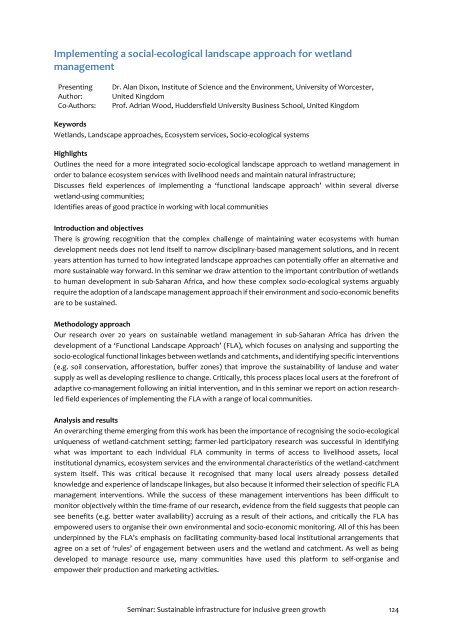2018 Abstract Volume
A compilation of the oral and written scientific presentations chosen to be part of World Water Week 2018 Seminars.
A compilation of the oral and written scientific presentations chosen to be part of World Water Week 2018 Seminars.
You also want an ePaper? Increase the reach of your titles
YUMPU automatically turns print PDFs into web optimized ePapers that Google loves.
Implementing a social-ecological landscape approach for wetland<br />
management<br />
Presenting<br />
Author:<br />
Co-Authors:<br />
Dr. Alan Dixon, Institute of Science and the Environment, University of Worcester,<br />
United Kingdom<br />
Prof. Adrian Wood, Huddersfield University Business School, United Kingdom<br />
Keywords<br />
Wetlands, Landscape approaches, Ecosystem services, Socio-ecological systems<br />
Highlights<br />
Outlines the need for a more integrated socio-ecological landscape approach to wetland management in<br />
order to balance ecosystem services with livelihood needs and maintain natural infrastructure;<br />
Discusses field experiences of implementing a ‘functional landscape approach’ within several diverse<br />
wetland-using communities;<br />
Identifies areas of good practice in working with local communities<br />
Introduction and objectives<br />
There is growing recognition that the complex challenge of maintaining water ecosystems with human<br />
development needs does not lend itself to narrow disciplinary-based management solutions, and in recent<br />
years attention has turned to how integrated landscape approaches can potentially offer an alternative and<br />
more sustainable way forward. In this seminar we draw attention to the important contribution of wetlands<br />
to human development in sub-Saharan Africa, and how these complex socio-ecological systems arguably<br />
require the adoption of a landscape management approach if their environment and socio-economic benefits<br />
are to be sustained.<br />
Methodology approach<br />
Our research over 20 years on sustainable wetland management in sub-Saharan Africa has driven the<br />
development of a ‘Functional Landscape Approach’ (FLA), which focuses on analysing and supporting the<br />
socio-ecological functional linkages between wetlands and catchments, and identifying specific interventions<br />
(e.g. soil conservation, afforestation, buffer zones) that improve the sustainability of landuse and water<br />
supply as well as developing resilience to change. Critically, this process places local users at the forefront of<br />
adaptive co-management following an initial intervention, and in this seminar we report on action researchled<br />
field experiences of implementing the FLA with a range of local communities.<br />
Analysis and results<br />
An overarching theme emerging from this work has been the importance of recognising the socio-ecological<br />
uniqueness of wetland-catchment setting; farmer-led participatory research was successful in identifying<br />
what was important to each individual FLA community in terms of access to livelihood assets, local<br />
institutional dynamics, ecosystem services and the environmental characteristics of the wetland-catchment<br />
system itself. This was critical because it recognised that many local users already possess detailed<br />
knowledge and experience of landscape linkages, but also because it informed their selection of specific FLA<br />
management interventions. While the success of these management interventions has been difficult to<br />
monitor objectively within the time-frame of our research, evidence from the field suggests that people can<br />
see benefits (e.g. better water availability) accruing as a result of their actions, and critically the FLA has<br />
empowered users to organise their own environmental and socio-economic monitoring. All of this has been<br />
underpinned by the FLA’s emphasis on facilitating community-based local institutional arrangements that<br />
agree on a set of ‘rules’ of engagement between users and the wetland and catchment. As well as being<br />
developed to manage resource use, many communities have used this platform to self-organise and<br />
empower their production and marketing activities.<br />
Seminar: Sustainable infrastructure for inclusive green growth 124


















